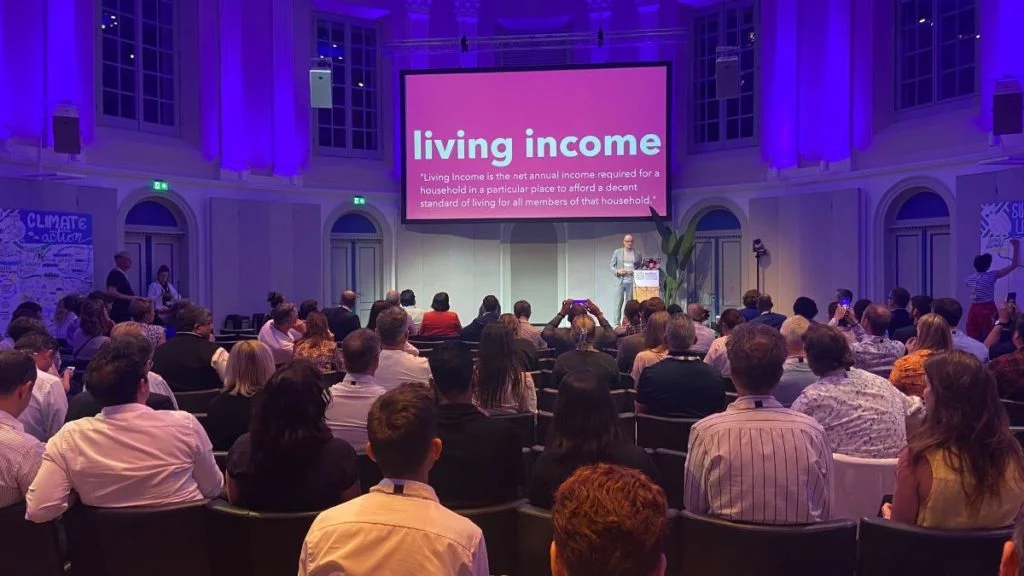
A dynamic opening day placed emphasis on climate action and sustainable livelihoods, bringing together industry experts from the cotton sector and beyond for discussions and interactive sessions.
We had the privilege of welcoming Nisha Onta, Regional Coordinator for Asia at WOCAN (Women Organizing for Change in Agriculture and Natural Resource Management) to kickstart the conference. Following her address, a panel of farmers from India, Pakistan, and Australia took to the stage to discuss the primary risks posed by climate change, and the practical adaptation strategies they have implemented in their respective farming contexts.
As the afternoon progressed, the focus shifted towards sustainable livelihoods. Antonie Fountain, from cocoa sector body VOICE Network, set the tone in a lively keynote and interactive session by exploring various paths to achieve a living income.
We were honoured to have Julia Felipe, a Mozambique field facilitator, share her first-hand experiences on the economic realities faced by smallholder farmers.
Lastly, Jyoti Macwan, the General-Secretary of the Self-Employed Women’s Association (SEWA), together with panellists discussed the concept of well-being as a component of livelihoods.
Five Key Takeaways from Day 1
Inspirational leaders, farmers, traders, manufacturers and more took the stage to share their stories and ideas. Here are five key takeaways:
- The climate crisis is impacting farmers now
Urgent action is required to mitigate further damage with a focus on the need for collaboration, data-backed solutions, and carbon finance projects to support farming communities in the face of extreme weather events. Farmers from leading cotton-growing countries, such as Pakistan and Australia, put into stark focus the real-world impacts of climate change on farms. - Living income is the right thing to do, the smart thing to do, and will soon be the only legal thing to do
A living income enables cotton communities to deal with other challenges, such as climate action and gender equality, much more easily, and within the next 3-5 years it could become a compliance issue for companies. To reach living income a combination of good agricultural practices, good governance practices and good purchasing practices are needed. Providing a living income will go a long way to improving farmer well-being, but it will not achieve it alone – we must also focus on providing access to social security and building resilience, among others. - Measurement and traceability are key to maintaining momentum in cutting emissions
To drive improvements, primary data on a local level is required to identify and address immediate concerns and focal issues. Impact measurement will be fundamental to recognising improvements and challenge areas. Primary data on a local level is also essential to evaluate where emissions are coming from – and this is where traceability will become crucial. - By organising female cotton farmers and workers we can improve well-being
Bringing female farmers together to raise their concerns and find solutions to their challenges, whilst also focusing on providing them with secure income and social security are important steps towards boosting their well-being. However, it is equally important to foster self-reliance and ownership among women, so that they have the power to make decisions about their lives and their farms. - We are not doing enough
The cotton sector needs to be bolder, work faster and stakeholders must act together. Collaboration is intrinsic to advancing sustainability progress, but compromise will be essential to drive change. Discussions placed focus on the complexity of industry collaboration and what realistic changes look like if they’re to be beneficial for the entire supply chain.
We express our gratitude to all the speakers and attendees for actively contributing to the success of this first day, and we look forward to what today will bring!
Today’s Agenda
The traceability and data theme will get underway courtesy of a keynote from Maxine Bédat, the founder and director of New Standard Institute. In this portion, conversations will range from the role of data in consumer-facing communications to the upcoming launch of Better Cotton’s own traceability system, and how it will impact stakeholders.
Regenerative agriculture is the fourth and final theme and will be introduced by keynote speaker and co-founder of sustainable farming foundation reNature, Felipe Villela. Whilst attendees will hear the unique experiences of cotton farmers from around the world on regenerative practices, an interactive session will also task delegates with exploring this topic and its potential from the behind the lens of various supply chain actors.







































